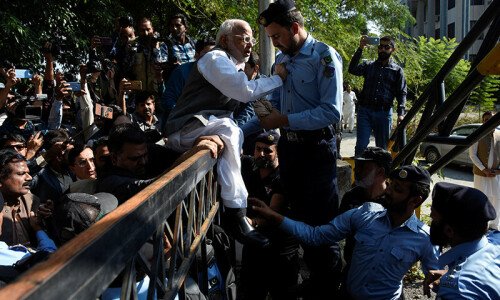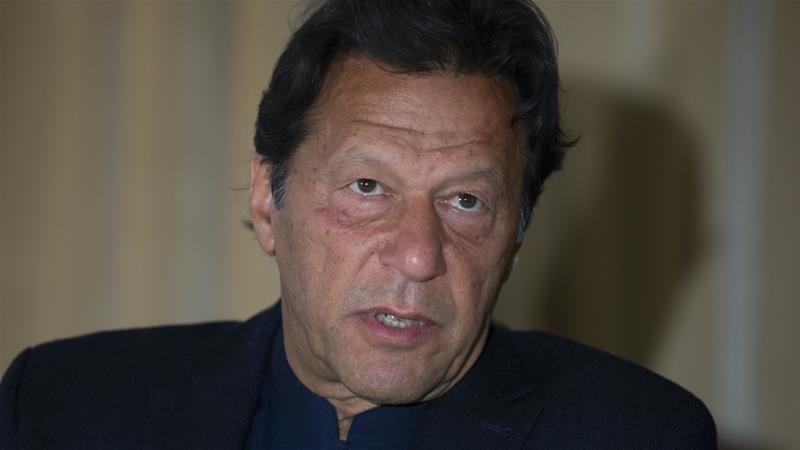
The Election Commission of Pakistan (ECP) in a landmark decision on Friday disqualified ousted prime minister Imran Khan in the Toshakhana case and barred him from holding public office.
The ECP in a unanimous decision found Khan guilty of “corrupt practices” and disqualified him from being a member of parliament.
The ECP also ordered criminal proceedings against Mr Khan who had been accused of concealing facts and incorrectly declaring details of presents he received from foreign dignitaries and proceeds from their alleged sale.
The gifts included Rolex watches, jewellery and a pair of cuff links.
His lawyers say they will challenge the commission’s verdict in the high court.
The reaction to the verdict from his supporters in several cities was unexpectedly very disappointing. Videos on social media showed police firing teargas to disperse his supporters holding a protest on the Motorway outside Islamabad. Security in the city has been stepped up.
Hours later, Mr Khan asked people to end their protest.
What led to Pakistan PM Imran Khan’s downfall
According to media reports, the ECP’s ruling says Mr Khan “made a false statement [sic] and incorrect declaration before the commission in the statement of assets and liabilities filed by him for the year 2020-21” and so attracted disqualification.
As a result of the disqualification, he “ceases to be a member of the National Assembly of Pakistan and his seat has become vacant accordingly”, the ruling adds, according to Dawn newspaper.
Legal experts cited by Dawn interpret this as Mr Khan being disqualified till the end of the current National Assembly term, which started in 2018.
The unanimous decision by a five-member panel of the ECP is a huge setback for the former premier, says the BBC’s Anbarasan Ethirajan.
Mr Khan admitted last month to have sold at least four gifts he had received during his tenure as prime minister, and that they had been included in his income tax returns.
Government officials must declare all gifts but are allowed to keep those below a certain value. In some cases, the recipient can buy them back at around 50%, AFP news agency reports.
Mr Khan, who has denied the charges against him, previously said he had not made public some gifts on national security grounds, but in a written submission admitted buying items worth nearly $100,000 (£90,000), and later selling them for more than twice that amount, AFP says.
Faisal Chaudhry, a lawyer in Mr Khan’s team, has told the Reuters news agency the ECP tribunal has no jurisdiction in the matter and that the decision will be challenged.
He told Al Jazeera they were awaiting the detailed verdict before filing an appeal to the Islamabad High Court. He also said they planned to question the commission’s scope to deliver such a verdict. “We will challenge their jurisdiction, their mandate in issuing this decision,” he said.
The case against Khan was filed in August by Barrister Mohsin Ranjha, a member of the Pakistan Muslim League Nawaz (PML-N).
He contended that the former prime minister had bought gifts given by foreign dignitaries from the state gift depository (also called Toshakhana) but did not disclose the assets in declarations submitted to the commission.
Mr Khan was ousted from power after he lost a no-confidence vote in April this year.
Khan, who was removed from his office in April through a parliamentary vote of no confidence, has accused the commission of bias, and has singled out its chief, Sikandar Sultan Raja, of prejudice against him and his party.
After the removal of his government, Khan has been holding rallies across the country, demanding early polls. His narrative has won him large swaths of support, as the PTI won big in by-elections which took place in July and October.
The duration of the disqualification was not immediately clear. Kanwar Dilshad, a former federal secretary of the commission, told Al Jazeera that in his opinion, the verdict meant Khan has been “disqualified for time being”.
“My view is that the verdict is valid for this parliamentary session, which will last till August 2023. What it means is he will not be able to sit in assembly, despite winning recent by-polls,” he said.
Dilshad further added that the commission has a broad mandate, which allows the institution to hear a case regarding corrupt practices and send it to trial court in the event of a guilty verdict.
Since then, he has been a vocal critic of the government and the country’s army.
The former leader has toured the country to deliver a series of fiery speeches calling for fresh elections.
The charismatic politician was elected prime minister in 2018, but fell out with Pakistan’s powerful army towards the end of his tenure. After a series of defections, he lost his majority in parliament.
Toshakhana controversy
The Toshakhana controversy erupted last year when it was disclosed that Khan and his wife Bushra Bibi bought gifts from the Toshakhana and later sold them in the market at discounted rates.
The PTI, which was the governing party at the time, had initially expressed reluctance to reveal the details of the gifts given to Khan, claiming it could potentially jeopardise Pakistan’s foreign relations.
The gift depository is a government department created in the 1970s, which stores gifts given to rulers, politicians, government officials and functionaries by heads of states and other foreign dignitaries.
Toshakhana rules state that all gifts must be submitted to the department. However, they can later be bought. While selling the gifts is not strictly illegal, many consider it unethical and morally wrong.
The case filed against Khan said the former prime minister had received a total of 58 boxes containing various items during his time in office.
PMLN petitioner Mohsin Nawaz Ranjha said the former prime minister was legally required to declare all assets belonging to him, his wife and dependents to the commission at the end of every financial year.
The reference argued that failing to do so rendered Khan “dishonest” and thus disqualified him from participating in parliamentary politics for life under the Pakistani constitution.
Khan was also accused of “deliberately” hiding the gifts that he bought from Toshakhana, but later confessed to having sold these gifts, without disclosing the details to the commission.
In a landmark ruling five years ago, the Supreme Court declared then-Prime Minister and PLM-N chief Nawaz Sharif “dishonest”, resulting in his removal from office and being barred from parliamentary politics for life.
Lahore-based political analyst Mehmal Sarfraz said the commission’s decision damaged Khan “politically”.
“His image has always been that of an honest man but now the ‘corrupt practices’ tag will stay with him. Of course, it does not mean his supporters will buy it since the PTI has been going after the ECP and the chief election commissioner for quite a while now, so they will see this as a ‘biased’ decision,” she added.
However, Sarfaraz noted that “when Nawaz Sharif was disqualified, the PTI celebrated it because it benefitted them.
“Now questions might be asked if Khan can remain the party chief or not, because Sharif was not allowed to continue leading his party after his disqualification.”
Legal expert Hasnaat Malik also painted a potentially troubling picture for the PTI chief in the coming days.
“The ECP in the verdict has sent the case to a trial court. However, if Khan is found guilty of corrupt practices in court, he could be imprisoned for maximum of three years,” he said.–Agencies/ Dawn/Aljazeera/BBC

The High Asia Herald is a member of High Asia Media Group — a window to High Asia and Central Asia

